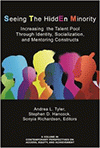
Seeing The HiddEn Minority
Increasing the Talent Pool through Identity, Socialization, and Mentoring Constructs
Edited by:
Andrea L. Tyler, Tennessee State University
Stephen Hancock, University of North Carolina at Charlotte
Sonyia C. Richardson, University of North Carolina at Charlotte
A volume in the series: Contemporary Perspectives on Access, Equity, and Achievement. Editor(s): Chance W. Lewis, University of North Carolina at Charlotte.
Published 2020
The participation of Black students in science, technology, engineering, and mathematics (STEM) fields, is an issue of national concern. Educators and policymakers are seeking to promote STEM studies and eventual degree attainment, especially those from underrepresented groups, including Black students, women, economically disadvantaged, and students with disabilities. Literature shows that this has been of great interest to researchers, policymakers, and institutions for several years (Nettles & Millet, 2006; Council of Graduate School (CGS), 2009; National Science Foundation (NSF), 2006), therefore an extensive understanding of access, attrition, and degree completion for Black students in STEM is needed.
According to Hussar and Bailey (2014), the Black and Latino postsecondary enrollment rates will increase by approximately 25% between 2011 and 2022. It is critical that this projected enrollment increase translates into an increase in Black student STEM enrollment, persistence and consequently STEM workforce. In view of the shifting demographic landscape, addressing access, equity and achievement for Black students in STEM is essential. Institutions, whether they are secondary or postsecondary, all have unique formal and informal academic structures that students must learn to navigate in order to become academically and socially acclimated to the institution (Tyler, Brothers, & Haynes, 2014). Therefore positive experience with the academic environment becomes critical to the success of a student persisting and graduating.
Understanding and addressing the challenges faced by Black students in STEM begins with understanding the complexities they face at all levels of education. A sense of urgency is now needed to explore these complexities and how they impact students at all educational levels. This book will explore hidden figures and concerns of social connectedness, mentoring practices, and identity constructs that uncover unnoticed talent pools and encourage STEM matriculation among Black STEM students’ in preK-12 and post-secondary landscapes.
Section 1-Socialization Social discourse concerning how male and females are supposed to enact their socially sanctioned roles is being played out daily in educational institutions. Individuals who chose STEM education and STEM careers are constantly battling this social discourse. It is necessary for P-20 STEM spaces to examine and integrate understanding of socialization within the larger societal culture for systemic and lasting change to happen.
Section 2-Mentoring A nurturing process in which a more skilled or more experienced person, serving as a role model teaches, sponsors, encourages, counsels, and befriends a less skilled or less experienced person for the purpose of promoting the latter’s academic, professional and/or personal development.
Section 3-Identity Research focusing on identity constructs in STEM has become more common, especially as it relates to student retention and attrition. Researchers have been able to use identity as a way to examine how social stigma can cause students to (dis)identify within STEM spaces.
CONTENTS
Preface. Acknowledgements, Andrea L. Tyler. SECTION I: SOCIALIZATION. Using the Frameworks of Socialization and Acculturation to Understand the Trajectory of Scientists of Color, Karri A. Holley and Joretta Joseph. Strategies for Using Critical Systems Theory to Support Socialization of African American Students in STEM, Sonyia C. Richardson and Lenora Crabtree. SECTION II: MENTORING. Mentoring for STEM Advocacy, Cameron Denson and Tamecia R. Jones. Different Worlds: A Picture of Mentorships at PWIs and HBCUs, Daniel Alston and Brandi Copeland-Kamp. STEM Doctoral Student Degree Attainment: How Demands, Structures, and Networks Impact Timely Degree Completion, Carrie Klein and Hironao Okahana. SECTION III: IDENTITY. The Role of Identity on Persistence for Black Women Doctoral Students in Science, Andrea L. Tyler, Letimicia Fears, and Monica Miles. Strengthening STEM Identities: Combatting Curriculum Trauma in African American Students, Stephen D. Hancock and Michelle B. Pass. Unearthing Factors That Contribute to Distorted Science, Identities in African American Women, Ansley Booker. Afterword—Recurring Themes, Constructs, Implications for Theory and Practice, and Recommendations, Guide, and Future Research, Stephen D. Hancock and Sonyia C. Richardson. About the Contributors.
-
Paperback978-1-64113-948-9
Web price: $45.04 (Reg. 52.99)
-
Hardcover978-1-64113-949-6
Web price: $80.74 (Reg. 94.99)
- eBook978-1-64113-950-2

- EDU029030 - EDUCATION: TEACHING METHODS & MATERIALS: Science & Technology
- EDU020000 - EDUCATION: Multicultural Education
- EDU052000 - EDUCATION: Rural
-
 Advancing Inclusive Excellence in Higher Education
Practical Approaches to Promoting Diversity, Equity, Inclusion, and Belonging
Advancing Inclusive Excellence in Higher Education
Practical Approaches to Promoting Diversity, Equity, Inclusion, and Belonging
-
 Developing Culturally Responsive Learning Environments in Postsecondary Education
Developing Culturally Responsive Learning Environments in Postsecondary Education
-
 Economic, Political and Legal Solutions to Critical Issues in Urban Education and Implications for Teacher Preparation
Economic, Political and Legal Solutions to Critical Issues in Urban Education and Implications for Teacher Preparation
-
 Imagining the Future
Historically Black Colleges and Universities - A Matter of Survival
Imagining the Future
Historically Black Colleges and Universities - A Matter of Survival
-
 Post-Secondary Planning for All
Approaches to College and Career Readiness Counseling for Special Populations
Post-Secondary Planning for All
Approaches to College and Career Readiness Counseling for Special Populations
-
 Preparing to Lead
Narratives of Aspiring School Leaders in a "Post"-COVID World
Preparing to Lead
Narratives of Aspiring School Leaders in a "Post"-COVID World
-
 Unveiling the Cloak of Invisibility
Why Black Males are Absent in STEM Disciplines
Unveiling the Cloak of Invisibility
Why Black Males are Absent in STEM Disciplines

